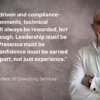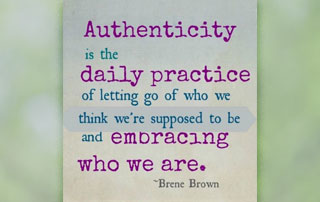It seems so obvious and simple. Ask for and receive feedback to show others you have a sincere interest in being a better person, professional and/or leader. Give feedback so that person understands how you feel and how they impact you and others. Yet as easy as this sounds, our single biggest struggle in developing and maintaining relationships and being effective as a person is effectively giving and receiving feedback.
If it’s so straightforward, why is it so hard? Why is it so critical? Without it, relationships lack trust and openness. Without trust and openness a relationship is not transparent, honest and strong enough. Strong relationships are the foundation of success in our families, communities, careers and our role as leaders.Without trust and openness we cannot effectively persuade and influence, address conflict, have courageous dialogue, address the elephant in the room, and drive change and development.
Essentially, we are pretty bad at giving and receiving feedback. But hope is not lost! With self-awareness, understanding, focus, and practice, we can get better.
What is needed to Give Feedback.
Focus.We need to slow down and prepare what we want to say and how we will deliver the message. We need to be fully present, and not distracted by texts, calls, emails or people walking by. Don’t wing it when giving feedback. Demonstrate thoughtfulness and care by prepping ahead what to say. Provide feedback on one thing, not several items all at once. Give the person a chance to process and consider how they want to respond to the one item at hand.
Listen. Once you have provided the feedback, listen. Observe. What is the reaction or non-reaction? Body language? Are they prepared to respond or discuss, or do they need time to reflect and get back to you, which should be ok.
Permission.Sometimes we are not ready for feedback. It might be a bad time or moment, or we are distracted or don’t have the right mindset. We need to ask for permission when giving feedback.
Trust & openness.We just agreed that we need to give and receive feedback for relationships to have trust and openness, but we also need trust and openness to give and receive feedback. How? Trust and openness are based on understanding each other and being able to answer several key questions:
- What are their passions and purpose?
- What experiences have shaped who they are and what is important to them?
- What gets them excited to start each day? What keeps them awake at night?
- What does success look like?
- What do they need help with?
- Can you find a shared experience and/or interest with them?
If we can answer these questions about someone, and they can answer these questions about you, you have a foundation of understanding and openness which leads to trust and the ability to effectively give and receive feedback.
Intent to help.When our intent is to help a person by providing feedback and our approach, style, tone and demeanor are encompassed in the spirit of helpfulness, the feedback we are trying to provide has a chance of making a difference.
What is needed to Receive Feedback.
Interest, Openness. We need to demonstrate that we are open to feedback, no matter who it’s from or what the topic may be.’ We need to listen, be fully present and pause and reflect before we respond. We need to avoid defending ourselves or reacting with giving feedback ourselves. Acknowledge the feedback; thank the person for the feedback. Repeat to ensure you heard them correctly. Try not to get emotional; take it all in. If you need time to get back to them with how you want to respond to the feedback, say so.
Ask, Share. Let others know that you are receptive and open to feedback. That you actually want feedback. It’s always more effective when you can let people specifically know what you are looking for feedback on, versus making an open-ended request for feedback.
Giving & receiving feedback. What we need to Avoid.
Feedback often happens in the heat of the moment, the worst possible time to give feedback. Built up frustrations explode, and feedback is given or received in a highly charged manner, causing significant damage to a relationship and eroding trust and effectiveness. We need to avoid the temptation of the emotions when giving or receiving feedback, when we are emotionally triggered, and cannot think, act or respond clearly or rationally. Try to stay calm so you can listen and take in. If you can’t, end the discussion until you can be non-emotional in giving or receiving the feedback.
The Personality Factor.
Understanding yourself and others, when you are trying to give or receive feedback, is critical. We use a tool, the Predictive Index® (PI®), to help increase one’s self-awareness, to understand one’s strengths, and how we deal with people, situations, and roles. Let’s review two of many different examples of personalities, and how we would deal with giving and receiving feedback. See where you can relate:
- Someone Assertive, Analytical, Reserved, High Sense of Urgency – when giving feedback this person can be too direct, it can come across as abrasive. They are not slowing down enough or have thought about how the message will come across to others. They have no problem with dealing with uncomfortable or unpopular information or decisions, as they don’t mind conflict. They prefer to have feedback provided to them in a direct, no nonsense way. Hit me between the eyes. Don’t dance around the issue, be clear and to the point. They also have no problem debating with the feedback and getting easily defensive. They can come across as wanting to respond even though the other person hasn’t finished giving the feedback.
- Someone Collaborative, Outgoing, Easy Going, Very Structured – when giving feedback this person can struggle with being direct enough or with dancing softly around the core issue. They can be hesitant to provide difficult feedback with the fear of not being liked or potentially compromising the health and pleasantness of the relationship. They are also concerned with the feedback potentially escalating, as they are very uncomfortable with conflict and would rather avoid it. They will be very direct if they feel that their acceptable levels of risk or preferred habitual patterns are endangered. When receiving feedback, they worry about the state of the relationship. They like doing things a certain way and become highly stressed if the feedback is suggesting doing things differently or it requires a significant amount of change. They need to understand what the implications are so they can be comfortable with the feedback.There are many other scenarios depending on our personalities, strengths, and how we deal with pressure and stress. The better understanding we have of ourselves, and of others, allows us to be more successful in how we give and receive feedback by adjusting our natural styles and self. By adjusting ourselves situationally (vs. changing who we are), we can find a way to communicate and interact where the messages are being heard and acted upon. It’s not easy. It takes patience, practice and feedback.
At MCG Partners, our purpose and passion is coaching and developing leaders, including the ability to give and receive feedback. This critical skill will make you a more effective leader, will engage your workforce, and will develop the next generation of top performers and leaders.








